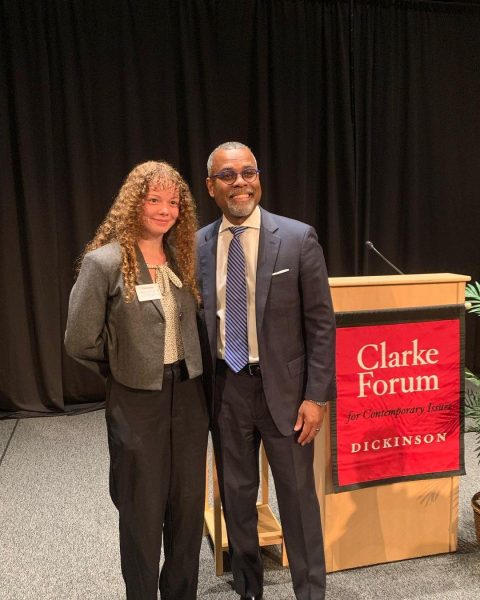Eco-Reps Extend to Sports
The Spring 2014 semester saw the launch of Dickinson’s new Athletic Eco-Reps program, which aims to increase sustainability within Dickinson’s varsity and recreational sports teams.
This summer, the College received an invitation from the University of Pennsylvania to join the Pennsylvania Collegiate Green Sports Consortium (PA CGSC), a regional network of Pennsylvania-based colleges and universities whose students collaborate to make athletic events on their campuses more sustainable.
Lindsey Lyons, assistant director of the Center for Sustainability Education, and Dina Henry, the college’s women’s basketball coach, volunteered to lead the program. Rachel Williams ’14, a member of the CSE steering panel, and Megan Layman ’16, a former member of the women’s basketball team under Henry, were brought on to serve as student leaders.
Dickinson is one of the eight founding members in the PA CGSC, alongside local schools such as the University of Pennsylvania, Franklin and Marshall, Temple University, Villanova University, Swarthmore College, Carnegie Mellon University and Lehigh University. Some of the member colleges, such as Lehigh, did not have Eco-Reps programs in place before joining the league. Others, including Dickinson, already had Eco-Reps programs to only monitor energy use in residential halls. The goal of the new Athletic Eco-Reps program is to apply the same practices to sports teams.
“The impact from the athletic Eco-reps work is to increase access and knowledge of sustainable practices within sports,” said Williams. “Dickinson’s culture tends to revolve around communities which tend to have problems bridging the gap between the communities. I hope that the athletic Eco reps will help to strengthen the ties between the athletic and sustainable communities on campus and open dialogue between the two.”
“The athletic teams in college [form] a big market,” said Lyons. Athletics involve a large amount of transportation, water, health, community and energy. However, each of these areas provides opportunity to make significant change. Lyons also notes that the attendance of games by alumni and parents can be influenced by the sustainability ideas through the athletics teams. The success of athletic teams will contribute to bigger strategies for the whole program at Dickinson.
The Athletic Eco-Reps program will follow the model of the residential Eco-Reps program and intends to place a representative in every athletic team. The program is still at goal-setting phase, and the leaders plan to start with recycling actions. They plan to recycle plastic bags used in athletes’ ice packs. Nearly thousands of them are produced per week. The leaders are optimistic about introducing early changes, but acknowledge the challenge posed by gaining the support of every team and coach.
“Some if the initiatives we plan to implement, like increasing access to recycling options, will be easy to accomplish,” said Williams. “But as our goals become larger, like making Dickinson’s athletic events zero waste, [they] will [become] more challenging as more stakeholders cooperation will be necessary.”
To find out more about the Athletic Eco-Reps program or to get involved, contact Lyons or Henry at [email protected] and [email protected].




